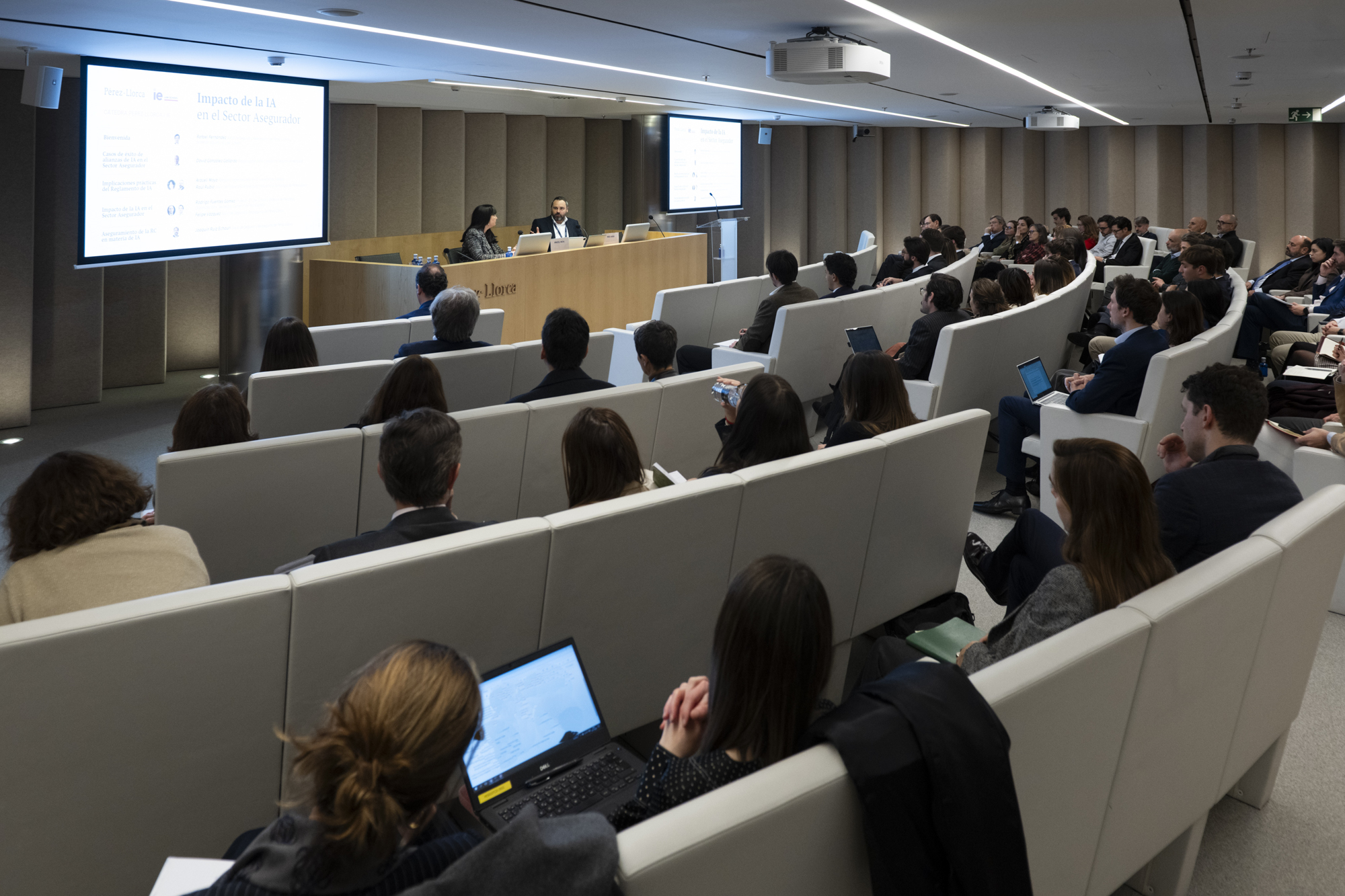Pérez-Llorca and IE Law School held a new session of their Chair on Commercial Law, in which they analysed the impact on the insurance sector of the adoption of new technologies and models based on artificial intelligence, as well as the new legal challenges and regulatory developments, knowledge of which is essential to understand the various practical implications of using these new tools.
The event was attended by Joaquín Ruiz Echauri, Insurance and Reinsurance partner at Pérez-Llorca; David González Gallardo, Head of the Insurance Unit at Microsoft; Rafael Fernández, Insurance and Reinsurance partner at Pérez-Llorca and adjunct professor at IE Law School; Araceli Moyá, lawyer specialising in privacy law at Sanitas; Raúl Rubio, Intellectual Property, Industrial and Technology partner at Pérez-Llorca; Rodrigo Fuentes Gómez, professor at IE Law School and Director of People, Organisation and General Secretary at AXA España; and Felipe Vázquez, Insurance and Reinsurance partner at Pérez-Llorca.
Rafael Fernández opened the event, announcing the topics to be discussed in the session. He highlighted the importance of analysing, from a legal and practical point of view, the response of the legislator and insurance sector bodies in adapting to this technology after its emergence in 2023, before introducing the first speaker, David González Gallardo. The Microsoft expert highlighted the significance of technology adoption in the insurance industry, and explained how artificial intelligence is revolutionising the policyholder experience by facilitating more natural interactions, as well as empowering employees and insurance agents. He also noted that AI optimises risk management and transforms key processes in the cloud, enabling companies to bring new products to market more quickly. “65% of the use cases in the insurance industry are focused on claims processing and customer service,” González Gallardo stated.
Raúl Rubio and Araceli Moyá then addressed the regulatory challenges facing the industry, underlining that the intangible assets created around artificial intelligence pose particularly complex challenges in terms of categorisation. Both agreed that while the regulatory framework may evolve, governance and compliance must remain key pillars. In this regard, Moyá stressed the importance of understanding the regulations and promoting sustainable governance: “Although AI is not new, its integration with the new European regulation may slow down internal processes, but not stop the implementation of new AI-based solutions, and should not be a brake on innovation. The challenge will be to manage, especially at the beginning, the legal uncertainty that may arise.” Rubio focused on the ethical component and emphasised the need to establish ethical committees to promote transparency in different scenarios and not be limited to use cases established by the regulations. “The biggest risk for organisations in the coming years is going to be reputational. It may be that companies engage in practices that are not prohibited, but which are reprehensible to the market,” Rubio stated.
In the next panel, Rodrigo Fuentes Gómez emphasised that in the case of insurance companies, as in any other industry, the human factor is fundamental. He stressed that organisations face the challenge of extending the benefits of digitisation to all teams in the organisation, not just a small, specialised group. “The challenge is to get the company to embrace technology as part of its culture, with a structured plan that doesn’t just stay with the technical team,” he said. Continuing along the same line, Felipe Vázquez argued that governance should not be the sole responsibility of the monitoring departments: “The key is to build a robust culture of oversight at all levels of the organisation, one which ensures stability and compliance without sacrificing operational agility.” Fuentes Gómez went on to point out the importance of key roles such as the Chief Data Officer and the Data Protection Officer, which implement functional processes that do not hinder the company’s operation.
Lastly, Joaquín Ruiz Echauri ended the session by addressing the impact of regulation on artificial intelligence, highlighting the European Commission’s White Paper on AI and the proposal for a directive on adapting non-contractual civil liability rules to artificial intelligence. The Pérez-Llorca partner pointed out that the directive moves away from holding AI systems directly responsible, focusing instead on the people behind the technology. In addition, it introduced the concept of “high-risk AI”, which includes systems used as safety components of a product or which, as products themselves, are subject to European legislation. This could lead to litigation where, in the event of these types of AIs causing harm, their creators would have to prove that they did everything possible to avoid such harm, even if the “high-risk AI” was used for a different purpose than intended. This poses new challenges for insurers, which will need to clearly establish the limits and conditions of policies covering these risks. “It is crucial that companies prepare for these regulatory changes, as they will have an impact not only on risk management, but also on the way insurance products are designed and offered, signalling a profound transformation in the sector,” Ruiz Echauri concluded.
